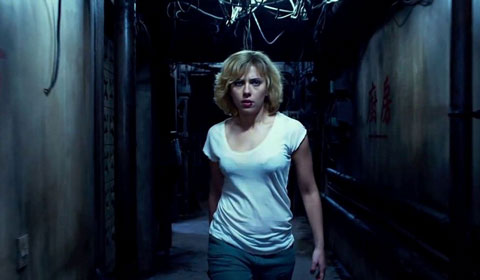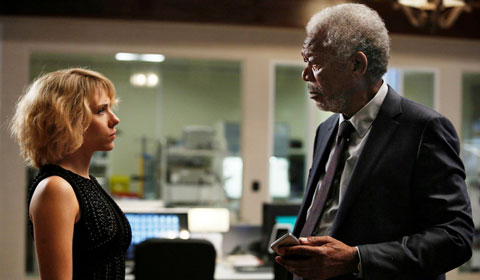





It's one of those films that skilfully draws you into its clutches and, once the magic kicks in, you will definitely feel as if you are using 100% of your brainpower.
It has long been hypothesised that human beings only use a small percentage of our cerebral capacity at any given time. For centuries, speculative science has postulated what would occur if mankind could actually evolve past that limit. Indeed, what would happen to our consciousness and newfound abilities if every region of the brain was concurrently active? If each one of the 86 billion densely packed neurons in a human brain fired at once, could that person become, in fact, superhuman?

With that arresting thought in mind, writer/director Luc Besson took the premise as a starting point for a storyline for his new film. He imagined what it would be like if we could access the furthest reaches of our brain, asking himself how that would affect our understanding of life and our role in it. He pondered: Would we have more control over ourselves and others?
Besson was interested in the notion of having an 'average girl', as he puts it, develop superhuman mental and physical capabilities when her mind is unlocked. He surmises: "Lucy has problems, like anyone else, and she doesn't know what to do with her life. Yet she's going to reach the most ultimate knowledge in the universe."
From La Femme Nikita and The Professional to The Fifth Element, writer/director Luc Besson has created some of the toughest, most memorable female action heroes in recent cinematic history.
To portray the lead in his latest film, he found the perfect actress in Johansson, who could be believable as extremely vulnerable, as well as super-powered, when her exposure to an illicit substance inadvertently makes her acquire incredible skills.

Although Besson believed that the idea of expanding one's brain capacities made for tremendous action-thriller material, he was particularly intent on grounding-at least in part-Lucy in scientific fact. The filmmaker offers: "After I met a few scientists, I was amazed by what they told me: about cancer, about cells, about the fact that we have hundreds of billions of cells that communicate with one another. Apparently, each cell sends out something like 1000 signals per second. The Web is nothing compared to that. It took me a few years to find the right balance between what is real and what is fantasy."
As he delved further into the concept, Besson reached out to a number of scientists, including world-renowned neurologist Yves Agid, who co-founded the Brain & Spine Institute (ICM) that is based at the Pitié-Salpêtrière Hospital in Paris, of which Besson is a founding member.
As the neurologist helped Besson walk the line between theoretical reality and imagination, he began to see that creativity for a filmmaker is not dissimilar to the skills needed to work as a scientist. Agid says: "That's what I find splendid in the film: There are true facts. For instance, Lucy deals with the number of cells in the brain, the number of signals per second produced by one cell, etc. By taking advantage of all these figures, Luc implements a fascinating dynamic throughout the film. Of course, the more Lucy advances through the movie, the more the story becomes fictional, which I find extremely robust. When you see the film, you believe it. It grabs you because it is grounded, to some extent, in reality."

Besson walks us through the research that informed his ultimate story: "There's a combination of factors that make this possible, involving really bad people and a new kind of drug. Well, actually, it's not exactly a drug. In fact, it's a natural substance that pregnant women produce in the sixth week of natal development called CPH4. I came up with this idea, which according to some doctors I spoke with, is not entirely illogical. At some point, when you open up the capacity of your brain, if you can access 20%, you can open 30%. When you reach 30%, you can open 40%, and so on. It's a domino effect. So Lucy is colonising her own brain, and she can't stop it. She doesn't want it, and she doesn't even know what to do with it."
Johansson admits that the most challenging part was to portray Lucy as a truly relatable character, despite the psychological and physical changes that she's experiencing: "As the drug kicks in, Lucy gradually loses the ability to empathise and to feel pain. Even though she can delve deeply into someone's memory and eventually control him physically, she doesn't have any opinion. She loses her preconceived ideas or judgment about the other person. It was difficult to avoid making my performance flat and monotonous. You have to see the humanity behind her circumstances."
When Besson wrote the first version of the script for Lucy 10 years ago, he intended the action to be set in Taipei, Taiwan. He had gone to the city in 1994 on a promotional tour for The Fifth Element and loved the people and the feel of the city. When the time came to scout locations for this action-thriller, the filmmakers considered a few different Asian cities to lens the picture-for budget and logistical purposes. Says Besson: "The funny thing is that, in the end, we shot in Taipei and picked the very hotel I'd stayed in 20 years ago. I couldn't have come up with anything better than what I had on my mind all those years."
If you are looking for a film that provides first-rate entertainment and out-of-this-world escapism, bet your life on Lucy. It's an intelligent and thought-provoking journey into humanity, showing that it is possible to go the extreme of all possible worlds.
Read more about Lucy and other new releases at www.writingstudio.co.za
